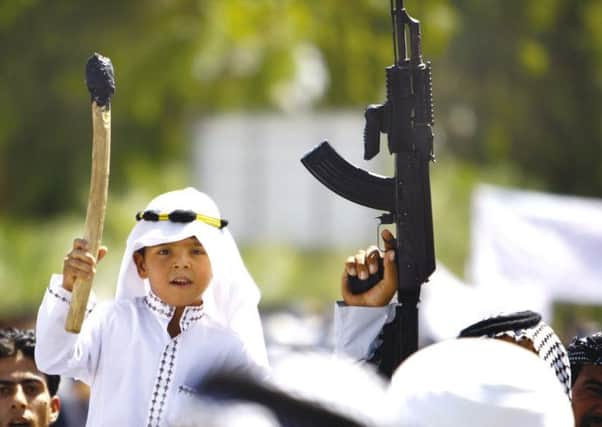Iran set to co-operate with US against Isis


President Hassan Rouhani, a relative moderate who has presided over a thaw in Iran’s relations with the West, said Tehran stood ready to provide help to Iraq within the framework of international law, but so far Baghdad had not requested such assistance.
Shiite Muslim Iran has been alarmed by the seizure last week of several major northern Iraqi towns by Sunni Islamist insurgent forces and their sweep southward to within an hour’s drive of Baghdad, and not far from the Iranian border.
Advertisement
Hide AdAdvertisement
Hide AdA senior Iranian official said that Tehran, which has strong leverage in Shiite-majority Iraq, may be ready to co-operate with the US in helping Baghdad fight back against the rebels.
Asked if Tehran would work with Washington in tackling advances by Sunni insurgents in Iraq, he replied: “We can think about it if we see America start confronting the terrorist groups in Iraq or elsewhere.”
The senior Iranian official said the idea of co-operating with the Americans was being discussed within the Tehran leadership.
For now, according to the Islamic republic’s media, Iran is willing to send Baghdad’s Shiite-led government advisers and weaponry, though probably not troops.
Last week, US president Barack Obama said he was reviewing military options, short of sending combat troops, to help Iraq repel the insurgency, but warned any US action must be accompanied by an Iraqi government effort to bridge divisions between Shiite and Sunni communities.
US officials said there were no contacts with Iran over the crisis in Iraq.
Rouhani said Iran would consider any request for help it got from Baghdad, though he was not aware of any American plans for Iraq or whether Washington wanted to help Baghdad. Rouhani told a press conference broadcast live on state television in Iran: “We all should practically and verbally confront terrorist groups.”
He suggested that the Sunni militants were linked to Iraqi politicians who lost in parliamentary elections held in April. Shiite prime minister Nouri al-Maliki won the election but has yet to form a coalition government.
Advertisement
Hide AdAdvertisement
Hide Ad“We will study if there is a demand for help from Iraq. Until today, no specific request for help has been demanded. But we are ready to help within international law,” he said.
“Entry of our forces [into Iraq] to carry out operations has not been raised so far. It’s unlikely that such conditions will emerge.”
The al-Qaeda-inspired insurgents – from the Islamic State in Iraq and al-Sham (Isis) – have already seized the key northern Iraqi cities of Mosul and Tikrit – Saddam’s hometown – and were yesterday within 50 miles of Baghdad’s city limits. Isis rebels are bent on recreating a medieval caliphate spanning territory they have carved out in fragmenting Iraq and Syria, where they have exploited a power vacuum in the midst of civil war. Al-Sham is the term used for greater Syria, often translated as the Levant.
Iran has built close ties with Iraq since the 2003 US-led invasion toppled Saddam’s Sunni-led government, and many influential Iraqi Shiites, including prime minister Nouri al-Maliki, have spent time in the Islamic republic.
Iran last week halted flights to Baghdad because of security concerns and said it was intensifying security on its borders.
After seizing Iraq’s second city, Mosul, home to 1.7 million people, and Tikrit last week, Isis vowed to take the battle all the way to Baghdad and the Shiite heartland of southern Iraq, home to the faith’s most revered shrines. They regard Iraq’s Shiite majority as “infidels”. Rouhani suggested that Isis forces, led by a shadowy commander called Abu Bakr al-Baghdadi, could not have made such swift gains on its own, saying “other issues and co-ordination were involved”. Figures from Saddam’s deposed government as well as other Sunni militants are believed to have joined Isis.
“Those defeated [in elections] have resorted to bullets. This is a grave blunder,” Rouhani said.
He said “terrorist groups” were getting financial and political backing and weaponry from some regional countries and some powerful western states. He named no countries, but was alluding in part to Sunni Gulf Arabs who Iran suspects have funnelled support to Isis.
Advertisement
Hide AdAdvertisement
Hide AdGulf governments deny any role in backing Isis, noting the group has long battled Saudi Arabia’s allies among other Sunni rebel factions in Syria.
Meanwhile, Britain is to give £3 million of aid to Iraq as the first step in dealing with the humanitarian consequences of the conflict. International Development Secretary Justine Greening said the first tranche of emergency cash would allow agencies to supply water, sanitation, medicine, hygiene kits and basic household items.
So far, thousands of people have fled the Isis advance.
The Department for International Development sent in experts to assess the scale of the crisis and it has now activated the UK’s Rapid Response Facility.